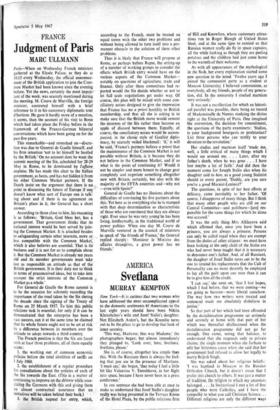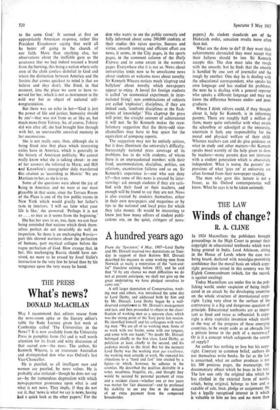Svetlana
AMERICA
MURRAY ,KEMPTON New York—It is curious _that two women , who have addressed the must uncomplicated appeal to the domestic sentiments of Americans in the last eight years shottkl have been Nikita IChrushchev's wife and Josef Stalin's daughter. Not Elizabeth Arden's, but ihe Kremlin turns out to be the place to go to develop that look of inner serenity.
'This way, Madame; that way Madame,' the photographers began; but almost immediately they plunged to, 'Look over, here, Svetlana; Svetlana, please.'
She is, of course, altogether less simple than this. With the Russians there is always the feel- ing that you are in the presence of Martians. 'I must say,' she began, 'that today I feel a little bit like Valentina V. Tereshkova, in her flight into space, because I have never been in a press conference.'
In one sentence she had been able at once to make us understand that Josef Stalin's daughter real, was being presented in the Terrace Room of the Hotel Plaza, by the public relations firm
of Hill and Knowlton, whose customary attrac- tions run to Roger Blough of United States Steel, and at the same time to remind us that Russian women really do fly in space capsules, all the while looking as though they are peeling potatoes and the children had just come home to the warmth of their welcome.
As with all appearances of the mythological in the flesh, her every explanation started some new question in the mind. 'Twelve years ago I joined the communist party as a student at Moscow University; I believed communism, as everybody, all my friends, people of my genera- tion, did. In the university I studied marxism very seriously.'
It was not a recollection for which an histori- cal parallel was possible, there being no record of Madamoiselle de Nantes studying the divine right at the University of Paris. One imagined the conversion, the decision for commitment, the questions of the party examiners: `Stalina, is your background bourgeois or proletarian? List three persons who can testify to your devotion to the revolution.'
Her studies and marxism itself 'made me, well, a little critical of many things which I would see around me. . . . Later, after my father's death, when he was gone . . . I have lost maybe a lot of faith.' And did then the moment come for Joseph Stalin also when his daughter said to him, as a good young Stalinist should to every parent, 'Daddy, are you sure you're a good Marxist-Leninist?'
The questions, in spite of her best efforts at delicacy, came inevitably to her father. 'Of course, I disapprove of many things. But I think that many other people who are still on our Central Committee—and politburo—[are] res- ponsible for the same things for which he alone was accused.'
It was the only thing Mrs Alliluyeva said which affirmed that, once you have been a princess, you are always a princess. Persons can only be called royal when they are exempt from the duties Df other citizens: we must have been looking at the only child of the Stalin era who had never been taught that it is necessary to denounce one's father. And, of all Russians, the daughter of Josef Stalin turns out to be the one to remind his replacements that the Cult of Personality can no more decently be employed to lay all the guilt upon one man than it can be to give him all the credit.
'I can say,' she went (m, 'that I lost hopes, which I had before, that we were coming—we are going to become—more liberal somehow. The way how two -writers were treated and sentenced made me absolutely disbelieve in justice.'
So that part of her which had been affronted by the destalinisation programme sat seriously and serenely at home with that part of her which was thereafter disillusioned when the destalinisation programme did not go far enough. One came, seeing that balance, to understand that she responds only to private claims; the single moment when she forbore to edit her bitterness came when she said that her government had refused to allow her legally to marry Brijesh Singh.
She was asked about her religious beliefs:
was baptised in Moscow in the Russian Orthodox Church, but it doesn't mean that I prefer this church to others. It was just a matter of tradition, the religion to which my ancestors belonged.... In Switzerland I met a lot of fine people who were Catholics, and I have the sympathy to what you call Christian Science... Different religions are only the different ways to the same God.' It seemed at first an appropriately American response, rather like President Eisenhower saying that we'd all be better off going to the church of our faith. More than anything else, her observations about the ineffable gave us the assurance that we had indeed rescued a brand from the burning, this being a nation where only men of the cloth confess disbelief in God and where the distinction between America and the Soviets that comes quickest to mind is that we believe and they don't. She fitted, in that moment, into the place we seem to have re- served for her, which is not as instrument in the cold war but as object of national self- congratulation.
But there was an echo in her—`God is just the power of life and justice; humanity should be one'—that was not from us or like us, but much more from Tolstoy. So, of course, Tolstoy did win after all; she had brought him through with her, an uneraseable ancestral memory in her unconscious.
" She is not really ours, then, although she is being fitted into that place which interesting exiles have in America, which is generally in the history of American publicity. We cannot really know what she is talking about: in one of her answers she referred to Marx.; and Hill and Knowhon's stenographer duly transferred this citation as 'according to Morris.' We are Martians to her, as she is to us.
Some of the questions were about the joy of being in America; and we were at our most plausible in that scene, since the Terrace Room of the Plaza is one of the few public rooms in New York which would gratify her father's taste in interiors. 'I will see later what your life is like, she answered. 'Perhaps it is not so . . . so nice as it seems from the beginning.'
She has her uses to us, too, then; we can bear being reminded that nations which think them- selves perfect do not invariably do well on inspection. So there is an unchanging Russia— part this shrewd wariness about the perfection of humans, part mystical collapse before the vague perfection of God. How strange that, in her, this unchanging Russia should have sur- vived, no more to be erased by Josef Stalin's instruction to the very few he loved than by his vengeance upon the very many he hated.



































 Previous page
Previous page